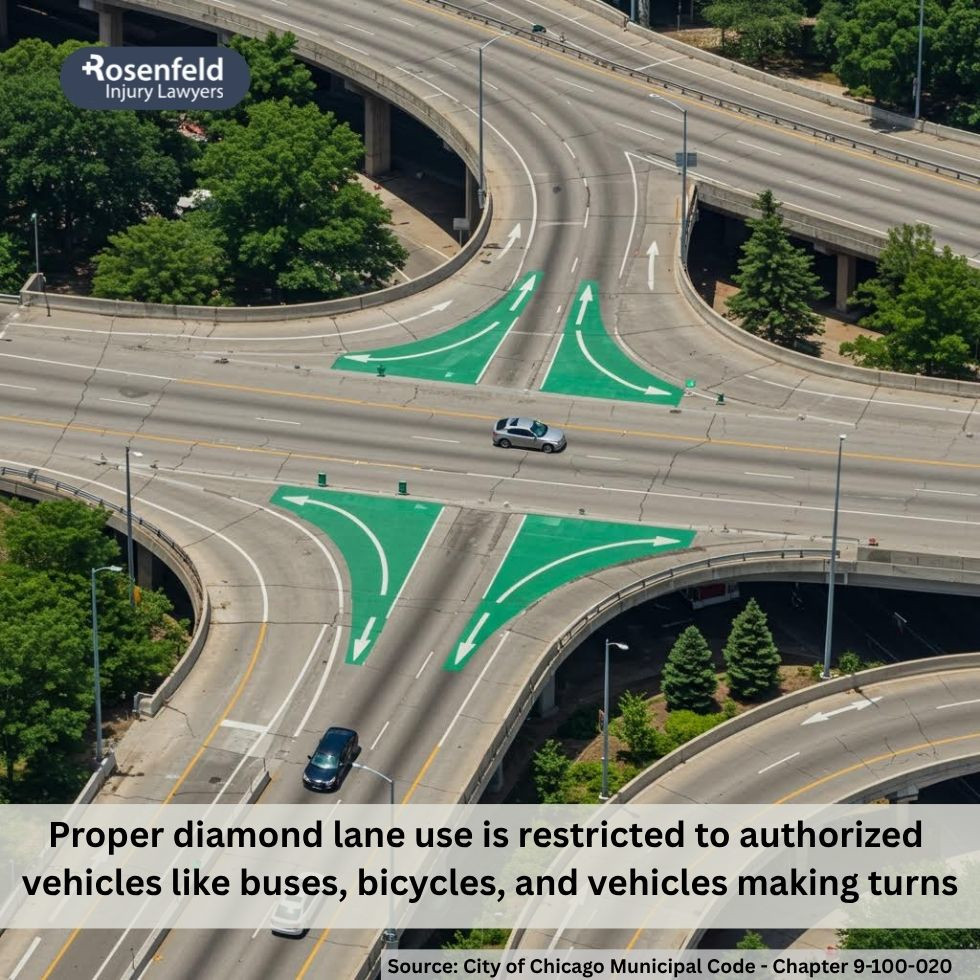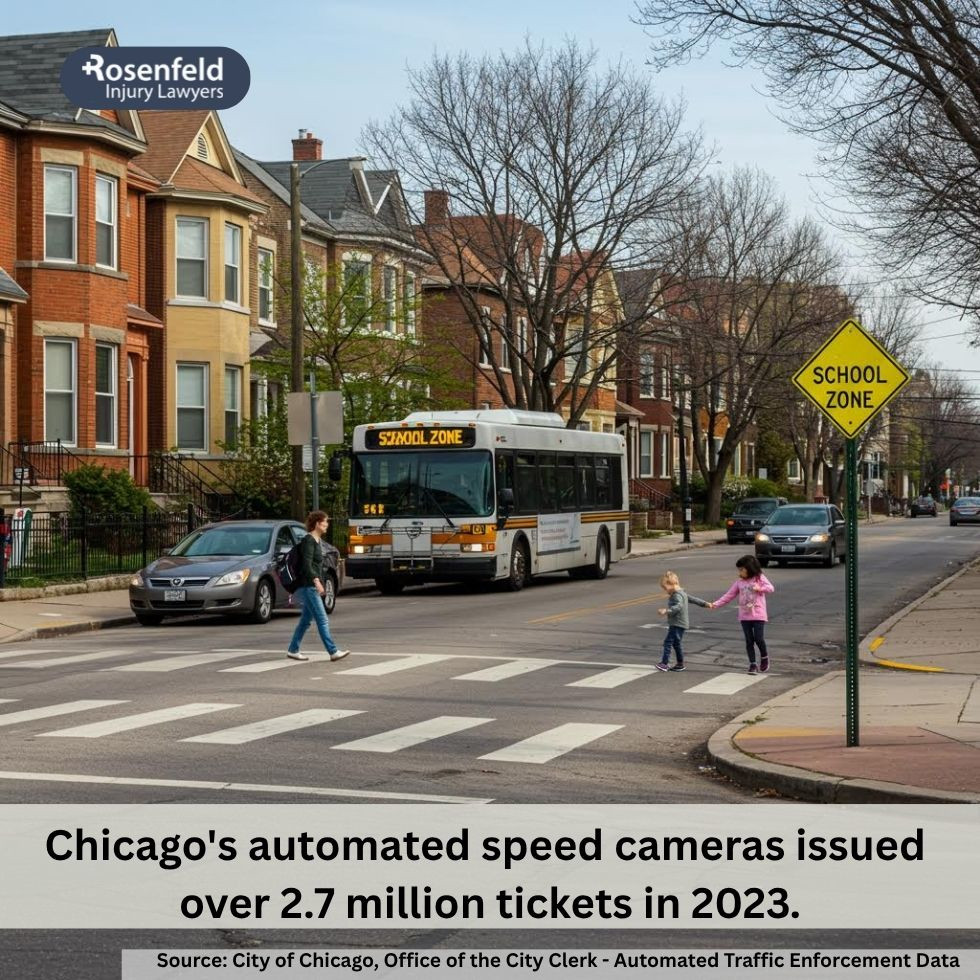- 24/7 Free Consultation: (888) 424-5757 Tap Here To Call Us
Traffic Laws in Chicago

Traffic laws in Chicago play a critical role in keeping the city’s roads safe for drivers, cyclists, and pedestrians alike. The city’s streets are a mix of fast-moving highways, neighborhood streets, and busy intersections. Every driver, cyclist, and person on foot shares responsibility for safety, and the city enforces strict rules to reduce accidents.
At Rosenfeld Injury Lawyers, we’ve seen firsthand how traffic violations can lead to serious injuries. If another person’s unlawful or reckless actions caused your accident, their violation may be the key to your personal injury case.
Illinois Road Laws Lay the Foundation
Cars in Chicago are governed primarily by the Illinois Vehicle Code (625 ILCS 5/). This law applies to all drivers in the state and sets the standards for:
- Speed regulations
- DUI enforcement
- Use of signals
- Pedestrian protections
The city enforces local ordinances in addition to the state code, such as red light cameras and parking regulations, but every driver must also comply with statewide driving laws.

Following Driver Laws is Crucial for Safety and Accident Liability
Road laws serve a dual purpose. They:
- Help prevent accidents by defining what safe driving looks like.
- Provide legal clarity when another’s misconduct injures someone.
If a driver runs a red light, speeds through a construction zone, or drives while distracted, that violation can automatically make them liable in court under the legal doctrine of negligence per se. Breaking a safety law and causing harm creates a strong foundation for a claim.
Speed Limits and What They Really Mean
The maximum legal speed in Chicago varies based on location. The general rules include:
- 15 mph in alleys
- 20 mph in school zones when children are present
- 30 mph in residential or business areas
- 25–35 mph on major streets, unless otherwise posted
These numbers are only speed limits under regular conditions. Motorists are required to reduce speed based on the conditions at the time.
Adjusting Speed for Conditions
Weather and street conditions often make posted speeds unsafe. Whether it’s black ice, heavy fog, or congestion, Illinois law requires drivers to lower their speed below normal thresholds if necessary. Failing to adjust to harsh conditions while behind the wheel can lead to citations and serious liability if a speeding crash occurs.
Understanding Illinois DUI Laws
DUI laws are strict and carry serious consequences. Drivers can be charged with a DUI for having a blood alcohol content (BAC) of 0.08% or more, 0.04% if they hold a commercial license, or any detectable alcohol if they are underage. Impairment due to drugs or cannabis also qualifies.
Even without a conviction, the presence of substances can be used as evidence in a personal injury case to help prove fault. Victims of drunk driving accidents should take notice that legal action can begin quickly, and timelines matter.
At Rosenfeld Injury Lawyers, we pursue maximum payment for clients, and you’ll never owe legal fees unless we recover compensation on your behalf.
Distracted Driving Is Illegal in Chicago
Using your phone while behind the wheel is one of the leading causes of crashes in the city. Illinois prohibits:
- Holding or using handheld devices while operating a vehicle
- Reading or writing messages
- Browsing social media or the internet
- Using a phone in a school or construction zone—even hands-free
People over 18 can use voice-activated or Bluetooth systems, but any handheld use is prohibited. Fines escalate with each offense, and causing an injury as a distracted driver could lead to arrest.
Obeying Stop Signs and Signals
Motorists must obey all roadway control devices, including:
- Stop signs: come to a full stop
- Red lights: do not proceed until the signal changes green
- Lane markings: stay in your lane, and only change where permitted
- Yield signs: allow others to go before proceeding
- Railroad crossings: stop when gates are down or lights are flashing
These laws in Chicago are enforced through citations, cameras, and, in personal injury cases, used to determine fault.
Right-of-Way Rules for Junctions and Crosswalks
Understanding right-of-way laws is crucial, especially in a dense urban environment like Chicago. Failing to follow them often leads to crossing accidents and serious crash injuries. Motorists must:
- Permits oncoming vehicles to move ahead before making a left turn.
- Let the first car to arrive at a four-way stop proceed first.
- Give priority to the vehicle on their right if both arrive at the same time.
- Defer to all motorists when entering from alleys, driveways, or private streets.
Responsibly Sharing the Road
Chicago laws prioritize pedestrian and cyclist safety, especially with so many passengers, bike commuters, and members of the public using city streets. You must:
- Always give clearance to those in crosswalks.
- Never overtake a vehicle stopped for walkers.
- Leave at least 3 feet when overtaking a cyclist.
- Don’t block or drive in bike lanes.
- Check for cyclists before opening car doors.
Violations cause frequent accidents, some fatal. Information gathered from these crashes helps shape future safety studies and public awareness messages.
Rules for Passing and Lane Changes on Chicago Streets
Multi-lanes require extra caution when changing lanes or passing another vehicle. You must:
- Signal at least 100 feet before switching lanes.
- Check mirrors and blind spots to avoid drifting into another lane.
- Do not change lanes when crossing streets or crosswalks.
- Go around only when it’s safe, legal, and authorized.
- Overtaking on the right is only lawful in certain conditions.
Unsafe lane changes often result in sideswipe accidents or rear-end crashes. According to records, these crash patterns vary by location and age. Drivers who transport passengers have a greater responsibility to prevent harm.
Understanding how these rules differ from rural places is essential, especially for visitors unfamiliar with the city’s pace and regulations. If a violation results in a crash, it’s in your best interest to retain legal counsel immediately.
Accident Reporting Mandates in Illinois
Illinois law requires drivers to file an accident report with the Illinois Department of Transportation (IDOT) within 10 days if:
- If the crash caused injury or a fatality..
- If the collision caused more than $1,500 in damage, or more than $500 for those without active coverage.
Even if police are present, a separate report may be required. Failure to submit can result in fines or license suspension.

Consequences of Violations: Fines, Points, and More
Breaking vehicle laws can lead to:
- Fines from $75 to several hundred dollars
- Points on your license
- Suspension or revocation for repeated offenses
- Increased insurance premiums
- Criminal charges in serious cases (e.g., DUI)
But beyond that, a violation can be the deciding factor in a civil personal injury case.
How Violations Impact Car Accident Claims
In personal injury cases, vehicle law violations often serve as clear evidence of fault. For example, if a driver:
- Speeds through a red light
- Texts while driving
- Drives under the influence
- Ignores a stop sign or fails to stop
This behavior can establish negligence per se, giving the injured person a better chance at winning their case. Police reports and eyewitness accounts are crucial.
Book a Free Consultation Today

If you or a loved one has been hurt in a car accident due to someone else’s reckless or unlawful behavior, you don’t have to face the aftermath alone. At Rosenfeld Injury Lawyers, we help Chicago residents understand how violations impact their rights and what to expect from the legal process. We build strong claims that cover every aspect of harm—medical bills, lost wages, and long-term pain.
Our Chicago car accident attorneys know how to deal with insurance companies that often shift blame or try to avoid liability. We take over the process so you can focus on healing. From the start, we handle all communication professionally, ensuring your voice is heard and your rights are protected.
It’s our job to file claims that meet every legal minimum while also maximizing recovery. If you need to file a lawsuit, we’ll guide you through the process. Some things shouldn’t be left to chance, especially after serious accidents. We work on a contingency basis, so you don’t pay any fees unless we win your case.Contact us at (888) 424-5757 or through our contact form to discuss your options.
All content undergoes thorough legal review by experienced attorneys, including Jonathan Rosenfeld. With 25 years of experience in personal injury law and over 100 years of combined legal expertise within our team, we ensure that every article is legally accurate, compliant, and reflects current legal standards.







